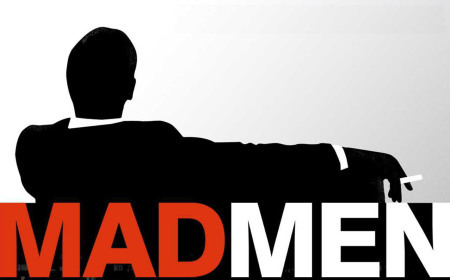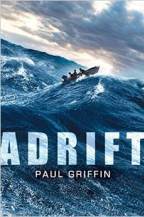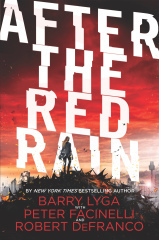Barry Lyga's Blog: The BLog, page 32
May 18, 2015
New Review: After the Red Rain
The May 15 edition of Booklist contains the second review of After the Red Rain, following on the heels of a great first one from School Library Journal. Here you go:
Lyga’s foray into the popular genre of dystopian romance seems tailored to be a blockbuster (especially given his collaborators are an actor and a producer). Though it hits genre conventions hard, it’s well written and unusual enough to stand out. In earth’s future, long after the planet’s ruin and mass species extinction, people live in cramped, perpetually warring Territories. After a hard childhood in an orphanage, Deedra is proud to be supporting herself with factory work building air scrubbers and going on scavenging forays into the crumbling cityscape called the Wreck. One day she sees a boy struggling to cross a poisoned river and rescues him. He calls himself Rose, and everything about him is strange: he is too pretty and perfect, without a Territory brand, and inexplicably living off the denuded land. He thinks differently from everyone else, too, which puts him and Deedra in danger from the tyrannical magistrate. Rose’s true genetic nature is unexpectedly novel, and that—combined with striking imagery, thrilling action, and adolescent true love—makes this a sure bet. HIGH-DEMAND BACKSTORY: Best-selling Lyga gets his mitts on dystopian romance? Better get two.
Don Draper: Dream King [Updated]

[Warning: Spoilers for Mad Men.]
Of course it ended with a commercial.
In retrospect, it’s obvious and the only way to do it, but I applaud Matt Weiner for picking the absolute perfect commercial, one that is not merely famous and well-known, but that specifically has emotional and cognitive resonance for the audience. (People who watch Mad Men are mostly olds, like me — we remember that commercial very well.)
I arrived home late last night, with the series finale already in progress. I watched it on a half-hour delay, then crashed after midnight. I haven’t read any thoughts about it, so maybe what I’m about to say is obvious or disproven. But I figured I would pound out some simple notions while I have a moment and the finale is fresh in my mind.
Asked once to describe his seminal comic book masterwork Sandman in a single sentence, Neil Gaiman allegedly replied, “The King of Dreams is told he must change or die…and makes his decision.”
Don Draper is never threatened with death at the end of Mad Men, but similarly has what seems like a simple choice — peace and happiness or returning to the rat race — and chooses wrong.
I suppose, depending on your own view of life, he made the right choice by returning to McCann and taking on the Coke account and creating that famous ad. But I don’t see it that way. And I think it’s pretty brave of Matt Weiner to say to his audience, “Look, some people don’t change. Not in any real way, in any way that matters.” Especially given that even a cursory perusal of Mad Men criticism has leaned heavily on the notion that Don would change in the finale, that he must change, that this is whole point of fiction, for God’s sake!
Not so much.
I keep thinking of that final shot of Don in Lotus position on the cliff overlooking the ocean. Everyone else is bearded, scraggly haired, dressed in comfortable flowing clothes. Don is clean-shaven, in khakis and a buttoned shirt. Like the famous werewolf, his hair is perfect.
This is important. In California, Don has been tested for one last time.
Everyone else on the show has gone through the crucible and come out changed. Joan has finally transitioned from a “Marilyn” to, well, not quite a Gloria, but at least a woman who has identified what she wants and is going to get it. Peggy has learned to open herself up and has figured out what she wants: the same stability Joan once craved, but at a higher level of independence and at a fraction of the cost. Roger has finally figured out that happiness does not require a woman young enough to be his daughter. And Pete has deduced how to put away the man he had to be and become the man he wants to be.
Don?
Don goes through the crucible, too. Like the hoboes he obsessed over as a kid, he travels the country aimlessly. He learns some things about people and about himself. He is betrayed by the closest thing to blood kin he has in the world. He loses the woman he convinced himself he loved. He loses his children. He confronts his own mortality, nearly begs Peggy for absolution, sees himself mirrored in a fellow human being, takes his first steps on the path to inner peace…
And then returns to the world to use his newfound knowledge to sell more sugar water.
That final moment with Don shows that no matter how much he thinks he’s changed, no matter how much he thinks he’s grown, he’s the same. He’s a man out of time. He can’t connect to the people around him. Don’s one great change in his life came in Korea, when he invented Don Draper from the remnants of his C.O. and Dick Whitman. Since then, he’s been stuck, caught in a rut of his own making. Don Draper can’t change because Don Draper isn’t real. He isn’t a person. He’s an invention, a mask designed and created by a terrified kid named Dick Whitman. Masks are frozen in place. They don’t express. They don’t change.
Don can experience the world, but he can’t be a part of it. He can notice its rhythms, but he can’t move to them. He can understand that people are seeking peace and tranquility, but when he tries to grab some for himself, it only makes him a better ad man. A more enlightened and effective shill.
Don is a dream king who can only dream of what other people want and need. It makes him a great ad man and a lousy human being. Just like in the very first episode of the show.
What a gloriously cynical ending, co-opting a moment of peace and brotherhood. As a diverse cluster of people sing for their common love of Coke in a commercial tugging at the heartstrings of Boomers and GenXers everywhere, Weiner reminds us, “Yeah, peace and brotherhood and people of all kinds coming together…all in the name of profits for a multi-billion-dollar conglomerate.”
Suckers.
[Update: If you’re interested, here’s the real-world story of the creation of that Coke ad.]
May 13, 2015
Every Day is (Not) a Disaster
 A few days back, Laura June, writing on The Awl, published a piece titled “Every Day is a Disaster.”
A few days back, Laura June, writing on The Awl, published a piece titled “Every Day is a Disaster.”
At 10:15 am on Monday, I got a text from Zelda’s nanny, who we expected at around 11:30 am: She was sick, and she needed to stay home. I wanted to throw the phone across the room, but I just stared it, then looked at my daughter. “It’ll be fine,” I told myself. “Today will just be a disaster. Like every other day.”
The piece goes on to describe Ms. June’s day, but also her mindset as she deals with caring for her 15-month-old daughter:
I’m fortunate to have another wonderful, dependable person to care for Zelda when I need to work, and I’m fortunate to be able to spend entire days at a time with her whenever I want to. But.
…I wanted to work that day. I wanted to accomplish things. I wanted that time to myself. [Emphasis in original.]
As a stay-at-home-dad who also works from home, I am obviously sympathetic to Ms. June’s plight. She has a further advantage I don’t, which is to say, she has a nanny to help her out (though not on the day in question). At Chez Lyga, it’s just Papa and Leia. So when she says, “After three solid days of entertaining a fifteen-month-old, I wanted a change of pace: not to lounge around or to sleep, but to do other things, anything almost!” I get it.
But.
At the end of five solid days of caring for a nearly-seven-month-old, I, too, am ready for a little break. But Saturday rolls around, and while my wife’s presence at home means I’m “off the clock,” as she likes to say, the fact of the matter is that rarely do I punch out for more an hour or so at a time. Yes, on a Saturday, I’ll vanish into the office for a little while to work, but when I hear Leia cry or fuss, I usually emerge and poke my head into the nursery to see if I can help.1
And now that the weather is nice and walks in the park are possible, my wife will often pack up the baby for a stroll on weekends. Daddy’s company is not required on these walks (I walk Leia plenty during the week!), so this is an opportunity for me “to do other things, anything almost!”
Yet, more often than not, I join Mama and Leia on those walks. Not because I have to. Not because my presence is required. But just…because.
Look, for the first couple of weeks when my wife went back to work, I was a wreck. I divided my time with Leia into “good days” and “bad days,” and believe me — almost every day was a bad day. To quote Ms. June: Every day was a disaster.
But they weren’t. I was the disaster. I was expecting a baby to be orderly, when babies are, in fact, agents of chaos.2 You don’t judge the day by the baby; you judge the day by your reaction to the baby.
Once my wife went back to work full-time, as opposed to her part-time transition period, everything clicked. I was now a full-time Dad, five days a week, no breaks. I couldn’t let Leia dictate how I felt each day.
What I came to realize is this: Every day is not a disaster. Every day is fine. Every day is just fine. Even the “bad” days are fine. Even on my daughter’s worst, most screamingist day, she laughs and giggles, and plays in her Go-Pod, and makes hilarious grunting noises as soon as she spies her bottle in Daddy’s hands.
And it’s fine.
Despite having a child who loves my attention, despite her antipathy toward a nap any longer than, say, half an hour, I’ve managed to work on a new novel (almost finished!), write some key scripts/workflows to make my life a little easier, assemble a video of my daughter’s first six months, and make dinner most nights. I’m a pretty lousy ’50’s housewife ’cause the house is always a mess, but I’ve decided not to care about that. Priorities!
I don’t consider any of that to be a disaster.
I agree with Ms. June when she writes “everyone needs their own space, even mothers and their babies, and when you unexpectedly don’t get it after days of the same things over and over, it can make you feel panicky.” One hundred percent true. I’m a creature of habit and routine, a devotee of order, and my kid is a live hand grenade tossed right at my meticulously scheduled life.
Oh, well.
The other day, our washing machine began leaking water from somewhere underneath. A quick call to the super and we were told to stop using it; he would be over first thing Monday morning. Now, I knew exactly what would happen from the get-go. I knew he would show up late, look at it, determine he couldn’t fix it, and schedule its repair for a date in the future.
Sure enough, he showed up three hours later than promised, with not a single tool in his possession. Perfunctorily examined the machine. Proclaimed he would need to call “the guy who fixes these,” and that this would probably happen the next day.
Realize: Just a few months ago, Old Barry would have flown into a rage at almost any of these points. Three hours late? You’ll be greeted with a pissed off Barry at the door. Not prepared? Grr. Need to call someone else? You’ll be asked “Why the hell didn’t you just send that guy in the first place?”
My schedule — such as it is these days — was wrecked. I’d lingered at the house to wait for him, and now I was being told that the next day would be a wash, too. (The repair guy gives you a five-hour window. Yikes!) And let’s not forget the worst part: Four days at a minimum without a washing machine while minding an infant who loves nothing more than finding ways to poop around her diaper and into her clothes.
But, hey. What can you do? Shit happens. Literally, too, in this case. When the super arrived (did I mention three hours late?), I answered the door with my daughter in my arms. She gave him her big, winning smile, and he laughed and said hello to her. She giggled. He apologized for being late, and I shrugged and let him in.
It was a bad day and it was fine.
So, if the bad days are fine, and the average days are fine, well…
That means the good days, my friends, are absolutely spectacular.
I suspect this annoys the hell out of my wife, who is obviously more than capable of handling the baby alone. I just can’t help it — I’m wired to check in after spending all that time alone with the baby.“Shtarker! Zis is KAOS! Ve do not ‘waaaahhh’ here!”
May 11, 2015
Love & Hate: Copyediting

A piece of the final page of Blood of My Blood from copyediting. Click for the whole image. Spoilers!
I’ve written before about copyediting. More specifically, about copyeditors. And more specifically than that about the copyeditor on my first few novels. But that was a long time ago, and after speaking about the process of copyediting on my podcast recently, I’ve had some more thoughts on the topic.
The title of this post is really a misnomer. Or at the very least, misleading. The fact is, there’s nothing I really love about the process of copyediting. It’s a slog. No two ways about it. When you’re revising (at gunpoint, for yours truly), you can convince yourself you’re doing something grand and sweeping and creative, even if most of what you’re doing is patching over your first draft screw-ups.
But with copyediting, you can’t pretend. With copyediting, you are fixing your mistakes. There’s no getting around it. On pretty much every page, you made a mistake, whether it’s dropping a comma (or adding an unnecessary one), using the wrong word in the wrong context, or bollixing up your own continuity due to a dialogue glitch.
Your literary mortality is shoved in your face, and you are forced to realize — to your horror — that without a copyeditor you might have published this!
That’s bad enough. But here are some other reasons why the process of copyediting drives me mad:
“I feel stupid.” You know, there’s nothing quite like being a dude who makes his living writing, who studied English at Yale, who has spent his entire life manipulating the written word…only to be reminded roughly ten thousand times in a manuscript of all the niggling little grammatical rules you break without realizing it. It totally makes you feel like a moron. And, yeah, I know that it’s easy to mis-place commas and improperly reference antecedents when you’re blasting along toward novel-length, but…come on! I’m supposed to be good at this! This is my castle, man, and I’m leaving the drawbridge down and letting syntax invaders into the keep. Makes me feel like an idiot, and no one likes feeling that way.1
“I’m tired of this.” By the time the copyeditor gets his or her hands on the manuscript, I’ve written it, read it a few times, revised it at least once on my own, discussed it with my beta readers, discussed it with my editor, and gone through a revision with my editor (perhaps more than one). At this point, I am psychologically and emotionally done with the story. It’s over. I’ve moved on. I just want the damn thing in your hands so that you can enjoy it. But, oh no, here comes the copyeditor, sniggering at my incorrect usage of the word “anticipate.”2
“I’m so sorry.” I am man susceptible to guilt over pretty much everything. Catholic/Jewish upbringing, dude. It’ll kill ya every time. I am reasonably certain, given my studies in the area, that I could conceivably get away with murder. But I wouldn’t try it. Because if the cops even suspected me and asked me a single question, my guilt would shine through. It’s one thing to know how to dispose of the body and clean up the evidence; it’s another thing entirely to look innocent afterwards. I feel guilty about stuff I didn’t even do, about stuff that isn’t even remotely my fault. So, imagine how I feel when I turn in a manuscript…and get back a document with literally thousands of copyedits in it.3 The guilt gushes forth like that bodega sushi you knew shouldn’t have eaten. It’s my job to write a book, to turn it in as clean as possible. And look at all the work I’ve made my poor copyeditor do. I should probably send a gift basket.
Copyedits are a necessary evil. Copyeditors, on the other hands, are necessary angels.
If it’s any consolation to authors out there — it isn’t to me, but so little is — my editor confirms that the copyediting process makes her feel like an idiot, too.Please note: The copyeditor does not actually snigger. The copyeditor actually very politely asks, “Are you sure this is the word you want to use here?” But in my fragile state of mind, I hear sniggering. Oh, yes, I do.Granted, most of them are “move this comma” or “change towards to toward,” but still.
May 8, 2015
Episode 15: Netflixing Books and More
 The fifteenth episode of Writing in Real Life…lives!
The fifteenth episode of Writing in Real Life…lives!
The winner of the first WiRL contest! Some necessary followup discussion on the nature of writing routines. Morgan wakes up early. Introducing Lyga’s Axiom. Morgan needs a whiteboard. How copyedits make you feel stupid. Barry is reading a lot…but can’t talk about any of it.
Please: send us feedback, subscribe/rate us on iTunes, and follow us on Twitter!
May 7, 2015
Teen Author Reading Night: Summer 2015
Once again, the season conjures a terrific slate of authors for your pleasure! As always, each event takes place between 6:00pm and 7:30pm of the night in question, at the Jefferson Market Branch of the New York Public Library, located at the corner of 6th Avenue and 10th Street.
Pay particular attention to the night of July 1, when a certain someone will be reading from his new book. Also, be sure to be there on August 5, for a terrific line-up, including Paul Griffin (reading from Adrift, which you have preordered, right?), Gordon Korman, and Jon Skovron. Always a good time when those guys are around.
June 3
James Dawson, This Book is Gay
Anne Heltzel, Charlie, Presumed Dead
Bill Konigsberg, The Porcupine of Truth
Trisha Leaver, Secrets We Keep
Kate Milford, The Broken Lands
Adam Silvera, More Happy Than Not
Sarvenaz Tash, Three Day Summer
Will Walton, Anything Could Happen
July 1
Matt de la Peña, The Hunted
Lori Goldstein, Becoming Jinn
Jonathan Kranz, Our Brothers at the Bottom of the Sea
Emmy Laybourne, Sweet
Barry Lyga, After the Red Rain
Carolyn Mackler, Best Friend Next Door
Margo Rabb, Kissing in America
Anna Schumacher, Children of the Earth
August 5
Sona Charaipotra and Dhonielle Clayton, Tiny Pretty Things
Katelyn Detweiler, Immaculate
Paul Griffin, Adrift
Gordon Korman, The Dragonfly Effect
Jon Skovron, The Broken Wondrous World
Jess Verdi, What You Left Behind
May 6, 2015
Gillian Flynn and I are Thisclose
Well, ha-ha and LOL! Just saw this in an email Amazon sends out to readers.
 Many thanks to whomever at HarperTeen thought to put me in the same sentence as Gone Girl. Now if only my sales lived up to the hype…
Many thanks to whomever at HarperTeen thought to put me in the same sentence as Gone Girl. Now if only my sales lived up to the hype…
Best of luck to you, Ms. Stokes!
May 5, 2015
But Seriously: Buy This Book
 Last week, I implored you to preorder Adrift by Paul Griffin. Well, just now Publishers Weekly has joined the chorus, giving the book a coveted star in its review:
Last week, I implored you to preorder Adrift by Paul Griffin. Well, just now Publishers Weekly has joined the chorus, giving the book a coveted star in its review:
In a terrifying survival story in which past traumas are as visceral and intense as present circumstances, five teenagers try to stay alive after becoming lost off the Atlantic coast. Raised in a blue-collar neighborhood in Queens, friends Matt and John are working in Montauk, N.Y., for the summer when they meet 17-year-old Driana Gonzaga, her Brazilian cousin Estefania, and Estefania’s boyfriend, João. After Estefania attempts some daring night surfing, the other teenagers attempt to rescue her in a small, ill-equipped boat; engine problems soon strand them. Griffin (Burning Blue) gives his characters just enough know-how to keep them from being completely helpless, but the situation is clearly beyond their control. Police emails and other communications provide brief respites from the rapidly degrading situation on the boat. Profound moments such as when Matt realizes that the “cruel” sun “was just being what it was. A mindless, merciless star that would shine on whatever got in its way” will haunt readers as much as the lethal injuries, worsening weather, class friction, and psychological instability the teenagers face.
Preorder Adrift now:
Amazon
BN.com
Indiebound
May 1, 2015
Win After the Red Rain, Tweet-style!
 So, the WiRL contest to win an ARC of After the Red Rain signed by me, Rob, and Peter is over (winner to be announced soon!). But that doesn’t mean you still can’t get one!
So, the WiRL contest to win an ARC of After the Red Rain signed by me, Rob, and Peter is over (winner to be announced soon!). But that doesn’t mean you still can’t get one!
If you want the ARC, this month’s contest is pretty darn simple: Just tweet your desire to have one with #AfterTheRedRain. Easy, right? Do so before the end of May and you might be randomly selected as a winner!
Important: You have to follow me (@barrylyga) on Twitter so that I can DM you if you win! If you win, but aren’t following me, I’ll choose someone else, someone I can get in touch with!
April 29, 2015
Lucky Day Goes to Germany
I’m happy to announce that  , will be published in Germany in June 2015!
, will be published in Germany in June 2015!
Nice cover, huh?
The title roughly translates to “The Evil Awakes,” which is pretty damn solid by my reckoning.
As in the U.S., e-only.
The BLog
- Barry Lyga's profile
- 2185 followers



